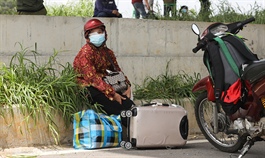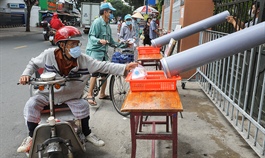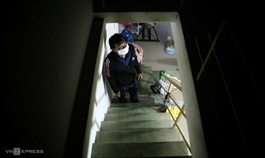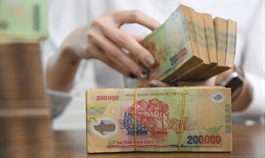Scaling up relief programs to better support businesses in need: Experts
Scaling up relief programs to better support businesses in need: Experts
Supporting programs should last until Vietnam can achieve herd immunity in late 2021 or early 2022.
As local businesses are facing unprecedented challenges from the pandemic, which led many to bankruptcy, experts called on the Government to scale up relief programs to better support those in need.
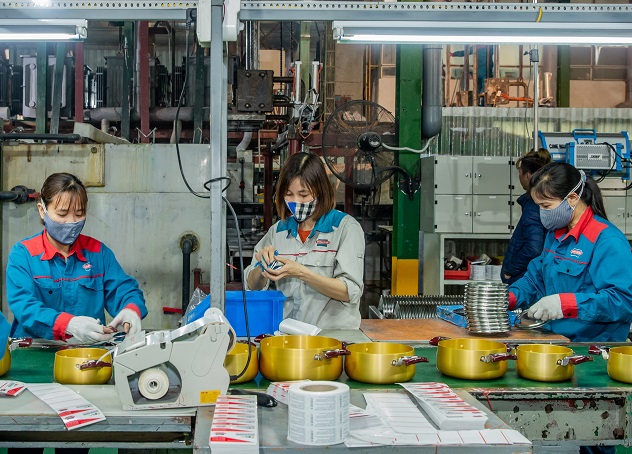
Production inside manufacturing plant of Sunhouse Group. Photo: Khac Kien
|
In the first seven months of this year, nearly 80,000 enterprises were forced to temporarily suspend operation, file for dissolution, or be dissolved, which represented a surge of 25% year-on-year.
This resulted in an average of nearly 12,000 enterprises exiting the market every month, which also included medium- and large-scale ones.
To support businesses and aid economic recovery, the Government has put in place various supporting policies and programs, including freezing and waiving fees and taxes, restructuring debt payment, or providing preferential loans for firms to pay workers’ salaries.
While these programs have no doubt alleviate some hardship for businesses, the prolonged pandemic has put many in a more vulnerable position than ever.
Vice-Chairman of the Hanoi Association of Small and Medium Enterprises (Hanoisme) Mac Quoc Anh told The Hanoi Times that common issues for firms are the difficulties in reaching customers due to the disruption in the distribution process and hiking prices of input materials.
“The inability to access bank loans and rising expenses for Covid-19 restriction measures are making it hard for firms to ensure long-term income for their workers,” Anh added.
Another issue, according to Anh, is the fact that not many are qualified for banks loan with a 0% lending rate to pay salaries for workers, mainly due to the requirements of not having bad debt at the moment of applying for the program.
Meanwhile, the majority of supporting programs is to delay payment of taxes and fees, so eventually, they still have to fulfill their financial obligation, he noted.
As part of measures, Anh called on the Government to lower land rental fees for enterprises in 2021. In long term, the Government should continue to improve the business environment, especially in land management, for businesses to expand operations.
“Current policies of waiving and freezing interest rates for loans incurred in 2020-2021 should be extended until late 2021,” he added.
CEO of Economica Vietnam Le Duy Binh urged support should vary depending on the severity of the Covid-19 impacts.
Binh said businesses in the pandemic epicenter where all activities are frozen, should be entitled to 100% tax exemption, and around 50% for those in other provinces/cities.
“This would provide them with financial means to recover once the pandemic subsides,” Binh noted, but adding time is essential for every policy to be efficient.
Cutting direct costs for businesses
Economist Can Van Luc also suggested the extension of support programs lasts until at least Vietnam is expected to achieve herd immunity by late 2021 or early 2022.
Luc expected other support programs in form of subsidiaries for electricity and telecommunication bills to be more substantial.
“The Vietnam Electricity should expand the group of beneficiaries of lowering electricity bill, foregoing at least VND6.8 trillion ($300 million), the same amount as last year,” Luc added.
The VND10 trillion ($435 million) support package for telecom subscribers, as Luc said is only to provide additional benefits for customers and not lowering telecom bills, noting the impacts, therefore, are limited.
Luc said mobile carriers could consider lowering telecom bills by 20-30% for the next three months.
In long term, the Chairman of the Vietnam Chamber of Commerce and Industry (VCCI) Vu Tien Loc noted the Government should take steps to help enterprises lower costs of credit, transportation, logistics, land, and compliance with administrative procedures.
In the latest move, the Ministry of Planning and Investment (MPI) proposed a new resolution to aid enterprises, focusing on helping enterprises keeping their business running with flexible restriction measures; ensuring value chains intact; lowering business costs, and simplifying procedures on quarantine of workers and foreign experts.





